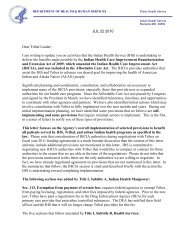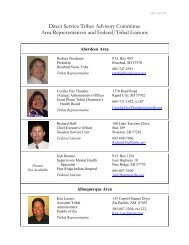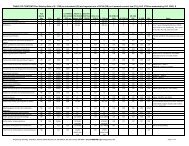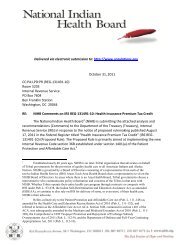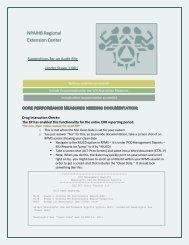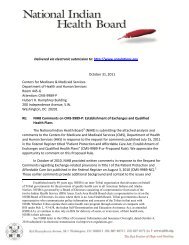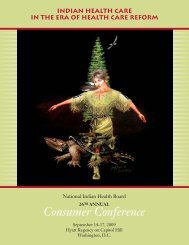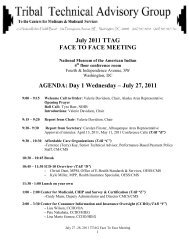mmpc - National Indian Health Board
mmpc - National Indian Health Board
mmpc - National Indian Health Board
You also want an ePaper? Increase the reach of your titles
YUMPU automatically turns print PDFs into web optimized ePapers that Google loves.
o American Recovery and Reinvestment Act of 2009, P.L. 111-5, 123 Stat. 115 (Feb. 17,<br />
2009).<br />
o Children's <strong>Health</strong> Insurance Program Reauthorization Act of 2009, P.L. 111-3, 123 Stat. 8<br />
(Feb. 4, 2009).<br />
o Patient Protection and Affordable Care Act of 2010, P.L. 111-148, 124 Stat. 119 (Mar. 23,<br />
2010).<br />
3. TRIBAL SOVEREIGNTY<br />
This policy does not waive any Tribal Governmental rights and authority, including treaty rights,<br />
sovereign immunities or jurisdiction. Additionally, this policy does not diminish any rights or<br />
protections afforded other American <strong>Indian</strong>s or Alaskan Natives (AI/AN) or entities under Federal<br />
law.<br />
The special government-to-government relationship between the Federal Government and<br />
<strong>Indian</strong> Tribes, established in 1787, is based on the Constitution, and has been given form and<br />
substance by numerous treaties, laws, Supreme Court decisions, and Executive Orders, and<br />
reaffirms the right of <strong>Indian</strong> Tribes to self-government and self-determination. <strong>Indian</strong> Tribes<br />
exercise inherent sovereign powers over their citizens and territory. The U.S. shall continue to<br />
work with <strong>Indian</strong> Tribes on a government-to-government basis to address issues concerning<br />
Tribal self-government, Tribal trust resources, Tribal treaties and other rights.<br />
Tribal self-government has been demonstrated to improve and perpetuate the government-togovernment<br />
relationship and strengthen Tribal control over Federal funding that it receives, and<br />
its internal program management. <strong>Indian</strong> Tribes participation in the development of public health<br />
and human services policy ensures locally relevant and culturally appropriate approaches to<br />
public issues.<br />
4. POLICY<br />
Before any action is taken that will significantly affect <strong>Indian</strong> Tribes it is the HHS policy that, to<br />
the extent practicable and permitted by law, consultation with <strong>Indian</strong> Tribes will occur. Such<br />
actions refer to policies that:<br />
1. Have Tribal implications, and<br />
2. Have substantial direct effects on one or more <strong>Indian</strong> Tribes, or<br />
3. On the relationship between the Federal Government and <strong>Indian</strong> Tribes, or<br />
4. On the distribution of power and responsibilities between the Federal Government and<br />
<strong>Indian</strong> Tribes.<br />
Nothing in this policy waives the Government’s deliberative process privilege. Examples of the<br />
government’s deliberative process privilege are as follows:<br />
5. The Department is specifically requested by Members of Congress to respond to or report<br />
on proposed legislation, the development of such responses and of related policy is a part<br />
of the Executive Branch’s deliberative process privilege and should remain confidential.<br />
6. In specified instances Congress requires the Department to work with <strong>Indian</strong> Tribes on the<br />
development of recommendations that may require legislation, such reports,<br />
recommendations or other products are developed independent of a Department position,<br />
the development of which is governed by Office of Management and Budget (OMB) Circular<br />
A-19.<br />
A. Each HHS Operating and Staff Division (Division) shall have an accountable process as



